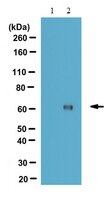ABE430 Sigma-AldrichAnti-methyl-CARM1 (Arg551) Antibody
This Anti-methyl-CARM1 (Arg551) | ABE430 antibody is validated for use in WB, IP for the detection of methyl-CARM1 (Arg551) | ABE430.
More>> This Anti-methyl-CARM1 (Arg551) | ABE430 antibody is validated for use in WB, IP for the detection of methyl-CARM1 (Arg551) | ABE430. Less<<Recommended Products
Overview
| Replacement Information |
|---|
Key Spec Table
| Species Reactivity | Key Applications | Host | Format | Antibody Type |
|---|---|---|---|---|
| H | WB, IP | Rb | Affinity Purified | Polyclonal Antibody |
| References |
|---|
| Product Information | |
|---|---|
| Format | Affinity Purified |
| Presentation | Purified rabbit polyclonal in buffer containing PBS with 0.05% sodium azide with 10% glycerol. |
| Quality Level | MQ100 |
| Physicochemical Information |
|---|
| Dimensions |
|---|
| Materials Information |
|---|
| Toxicological Information |
|---|
| Safety Information according to GHS |
|---|
| Safety Information |
|---|
| Packaging Information | |
|---|---|
| Material Size | 100 µg |
| Transport Information |
|---|
| Supplemental Information |
|---|
| Specifications |
|---|
| Global Trade Item Number | |
|---|---|
| Catalogue Number | GTIN |
| ABE430 | 04055977125283 |
Documentation
Anti-methyl-CARM1 (Arg551) Antibody SDS
| Title |
|---|
Anti-methyl-CARM1 (Arg551) Antibody Certificates of Analysis
| Title | Lot Number |
|---|---|
| Anti-methyl-CARM1 (Arg551) - 3215964 | 3215964 |
| Anti-methyl-CARM1 (Arg551) -Q2485922 | Q2485922 |








 propane[803546_2Bis(4-hydroxyphenyl) propane-ALL].jpg)





